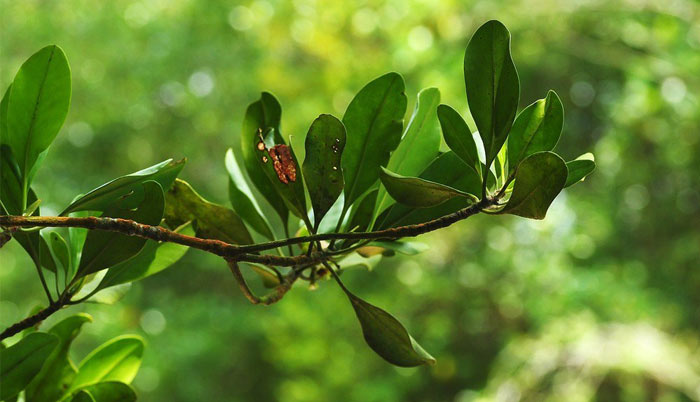![]() Home > Indonesia
Home > Indonesia
Foreign Researchers ‘Steal’ Indonesia's Genetic Resources

Mangrove leaves. | PHOTO: Shutterstock/File
![]() February 22nd, 2017 | 11:36 AM |
February 22nd, 2017 | 11:36 AM | ![]() 1689 views
1689 views
WORLD
Govt may incorporate clause on biopiracy in revision of 1990 bill on natural resources
As one of the most species-rich countries on earth, Indonesia attracts researchers from around the world to study the archipelago’s unique ecosystems, which contain a diverse array of flora and fauna.
Indonesia, for instance, possesses 10 percent of the world’s flowering species, 12 percent of the world’s mammals and 17 percent of the total species of birds, despite occupying only 1.3 percent of the world’s land surface.
However, this rich biodiversity makes Indonesia a haven for biopiracy, a practice where natural resources and traditional knowledge are being exploited without consent.
“There are lots of cases we’ve discovered that have occurred through research and cooperation where we haven’t realized that our genetic resources were being stolen,” said Rosichon Ubaidillah, the head of zoology at the Indonesian Institute of Sciences (LIPI) biology research department.
He cited various examples, including varieties of Indonesian eggplants, the genetics of which have been mapped by the Netherlands. “There’s an Indonesian researcher whose study was funded [by the Netherlands]. He unwittingly collected samples of eggplants, which now have now been genetically mapped by the Netherlands. This is very sad,” Rosichon said.
Last November, Rosichon requested that his student not accept any scholarships from the German government because it required the student to collect samples of Indonesian insects in order to find new antibiotics.
“I told my student that she had two options, to risk [our genetic resources being stolen] or to find another school. She finally applied for an Australian scholarship because Australia doesn’t require us to bring samples to the country,” he said.
Foreign countries, he added, are also allegedly trying to collect genetic samples through other means, such as cooperation with researchers in Eastern Indonesia, where foreign researchers come to teach Eastern Indonesia’s researchers.
Rosichon cited an example concerning Khairun University in Ternate, North Maluku. “The university once worked with foreign researchers to teach them how to collect and conserve marine biodiversity, but they don’t even have marine biology faculty or equipment,” said Rosichon.
These incidents are only the tip of the iceberg as many biopiracy cases go undetected with little to no regulation on how to protect genetic resources in the country.
Foreign researchers, for instance, could disguise themselves as tourists and go to national parks to collect samples of tree bark, logs, dried leaves and even soil that contains living microorganisms. The samples would be brought to their countries, isolated, studied and produced as medicine or other products.
As there is no clear regulation protecting genetic resources, the House of Representatives is currently revising Law No. 5/1990 on natural resources and ecosystem conservation.
“The current law only regulates information about species and ecosystems. In the latest draft of the revision bill, genetic resources have been included,” Indonesian Communication Forum on Community Forestry (FKKM) executive secretary Andri Santosa, who has been involved in the deliberation of the bill, said.
The bill, which is included in the 2017 priority list, will lay out the legal framework for protection of genetic resources in the country, such as sanctions for biopiracy perpetrators, he said.
Source:
courtesy of THE JAKARTA POST
by Hans Nicholas Jong
If you have any stories or news that you would like to share with the global online community, please feel free to share it with us by contacting us directly at [email protected]